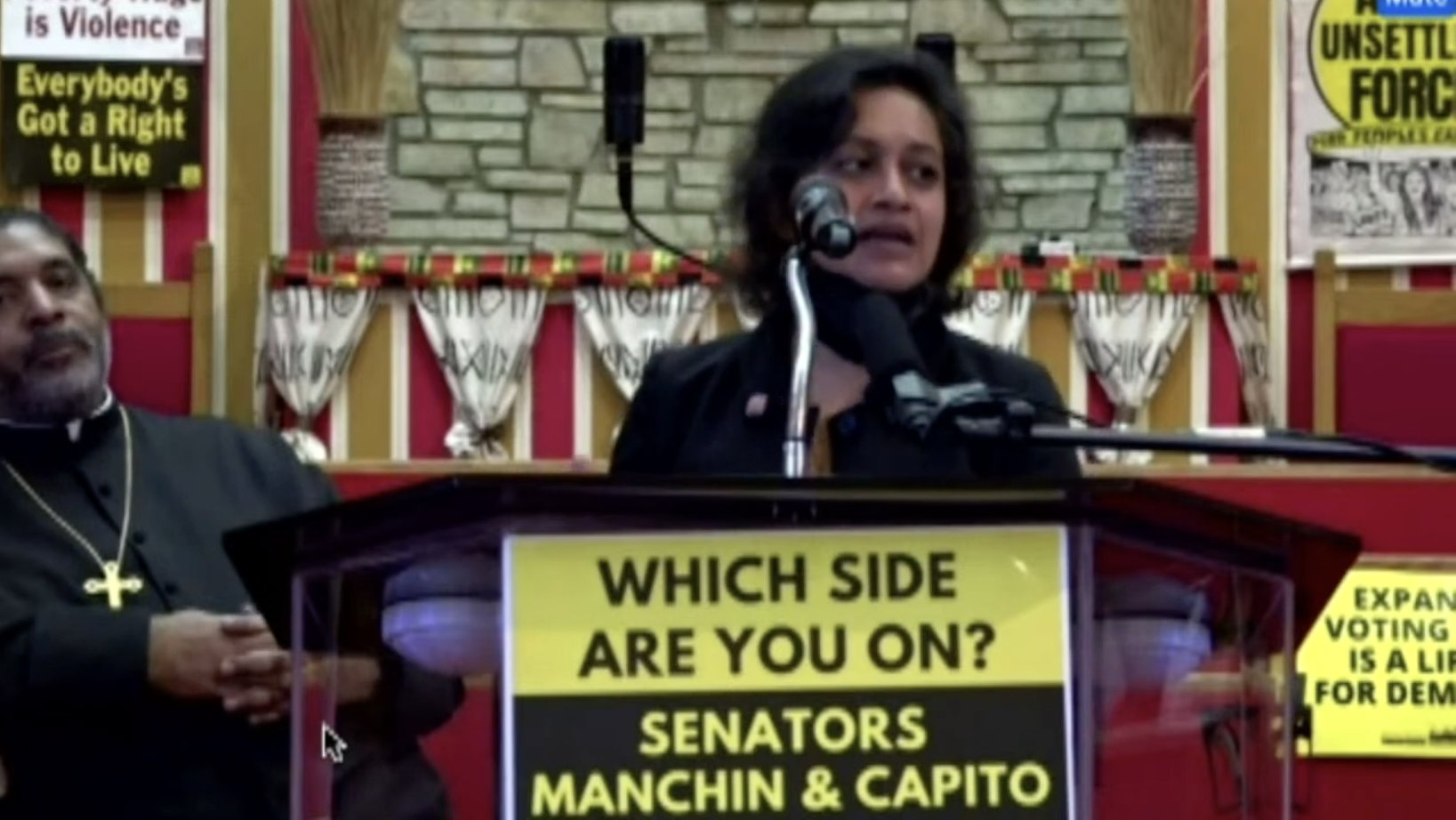Poor People’s Campaign Addresses the For the People Act
On Thursday, leaders from the Poor People’s Campaign, Repairers of the Breach, and the Kairos Center, along with West Virginia pastors, miners and low-wage workers sent a letter to Senators Joe Manchin (D-West Virginia) and Chuck Schumer (D-New York), requesting that Schumer call to action an immediate vote on the Fort the People Act. Several people came together in person and virtually at First Baptist Church in West Virginia to address the need for the act, along with the full version of President Joseph R. Biden’s Build Back Better Plan, to be passed. The aforementioned senators have been among the Democrats who opposed the passing of the act, which would give voters full protections. In addition, the plan would provide an extension of the Child Tax Credit, along with several economic tools to help the country’s 140-plus million who are living in poverty. Below is a clip from the press conference led by co-chairs of the Poor People’s Campaign Bishop William J. Barber II and Rev. Dr. Liz Theoharis:
After the press conference, we spoke with Bishop Barber about why Manchin refused to support the For the People Act with no Republican backing.
“One, it’s ridiculous because voting rights is not about bi-partisan support, it’s about upholding the Constitution,” said Barber. “When you have an extremist Republican party, they have shown that they are not for fundamental rights of democracy, it was a majority Republican Supreme Court that gutted the Voting Rights Act in June 2013. [Senate Minority Leader Mitch] McConnell has never seen a voting rights law that he liked, and they’ve had eight years to expand voting rights and he’s never brought anyone in the party to do move on it.”
“When John Lewis wrote the For The People Act, long before President Biden got in office, the Republicans could’ve compromised and voted on it. When you get the majority to do something right, you do what’s right. None of our voting laws, such as the 15th Amendment, the Voting Rights Act of 1965, there were always groups that when there was compromise, they made the laws weaker.”
“For Manchin, that line is just a trope. The bottom line is that our democracy is under a fundamental attack, and the 400 bills in 49 states that suppress the right to vote, if they ultimately have their way, 65 million Americans, white, Black, brown, disabled, women and young people will lose opportunities to the ballot that they had in 2020. It’s not a Black issue, it’s a democracy issue. So what Manchin should be doing is doing what’s right. Congress, based on the 15th Amendment, is the only body that can ensure that no one’s right is denied or abridged. What we see going on now is the abridgement of the right to vote.”
“We know that Manchin is following the U.S. Chamber of Commerce, and they are against full restoration of the Voting Rights Act. If you have full restoration, it’s going to mean that states cannot pass voting laws without being pre-cleared. That is going to ensure that people get elected without bowing down to corporate interests. The people will get elected officials who will vote for $15 minimum wage, healthcare for all. So the corporate interests do not want that, and they want to shrink the participation of the American electorate.”
“Therefore, Manchin, who is funded by them, he does not want that. He is standing in a bad tradition, a tradition that is as old as John Calhoun. He was a staunch advocate of the filibuster and believed that the rights of the Southern plantation owners should be protected. Even though Manchin signed off on the For the People’s Act and told John Lewis, he supported it. If he saying that even if the bill is right, even if it’s constitutional, even if it’s just, a Republican joining is more important than doing is right. Dr. King said that moderates were the greatest enemy of civil rights, because they were more interested in order than in justice. You cannot separate Manchin’s desire to feed for-profit interests from his refusal to support For the People Act and the Voting Rights restoration.”
“Lastly,” said Barber, “how immoral is it that Manchin spent a whole year claiming that he would get Republican support, which he never got. He was able to get senators to compromise from the For the People Act down to his bill, the Freedom to Vote Act, which none of us like, because we don’t have the freedom to vote but a right to vote. He even was able to get voter ID codded down which many of us are against. It would require states to have 15 cases of voter discrimination fully adjudicated to the highest court in the land before they would be required to be covered under Section 5 of the Voting Rights Act. He didn’t even vote on his own compromise. That proves this is a sham for him, and that he is committed to corporate interests.”
Barber speaks of their determination to see this through to its completion. “This battle is long from over. Someone said that they killed the Voting Rights Act; but they didn’t kill it, they delayed it. Throughout history, there have always been times when extremists have blocked laws. Remember, they blocked the Civil Rights Act of 1964, but ultimately the people won. How did they win? They kept mobilizing; they kept building and kept telling the truth. Even now we’re mobilizing a mass of poor people’s low-wage assembly march on Washington on June 18, 2022, the largest gathering of religious leaders and low-wage people in the country.”
“We’re saying that our deadline is victory!”
Rev. Dr. Liz Theoharis addressed how citizens can we ensure that we’re never in this position again when it comes to voting rights? I have a favorite quote from Frederick Douglass and he says that, ‘Freedom requires eternal vigilance,’ so I think that we decide to protect it every day, and we fight the struggle to keep it protected.”
“That means we organize and we fight until victory, and then we stayed organized. 1/3 of the U.S. electorate are poor people, and in the 2020 election, it was 40% of the electorate are poor people. When voting is across lines that divide us, have the potential to shift the entire political landscape of a nation.”
“I think that what history shows is that through our current organizing; we defend this democracy to make life better for everyone as a moral fusion movement. It’s folks fighting on the streets and on the ballot boxes and showing what this society can be and must be. It’s going to take a shift in legislation and economic and political power of impacted people. When democracy and living wages and immigrant rights are under attack, people have fought and won, never letting up.”
She continues on how people can help to shift the moral narrative, which is one of the campaign’s mission goals. “We do that by getting our nation to pay attention around the needs and priorities around 140 million poor people.”
“That means we launch with the largest wave of nonviolent civil disobedience in U.S. history and calling the injustices in our society. It takes providing awareness in the media. It’s not that folks that people are lazy, but there are structures in place that keep people impoverished. We’re not trying to curse the darkness, but shine a light. It means doing action together, and it means moral analysis, moral articulation and moral action. It’s those three moral uprisings that help us to shift the narrative.”
“As a Biblical scholar, it means addressing what the genuine issues of the day are. It’s not about whether Jesus was a card-carrying member of the NRA, it’s about ‘when I was hungry, did you feed me? When I was naked, did you clothe me?’ and saying that to the nation. Are we organizing the nation around those who have been excluded and left out?”

Finally, we spoke with Shailly Gupta Barnes, Policy Director at the Kairos Center, who addressed the need for urgency of the Build Back Better Plan being passed in its full capacity.: “There is a plan that was proposed in 2021 that over $3 trillion dollars would go to paid leave, expand the Child Tax Credit, expand healthcare, and access to Medicaid expansion. We’re still facing an economy with millions of jobs short. The pandemic brought millions more to the edge of poverty. We need to take it up now at the full $3 trillion, because it would bring so much to Black and Latino families.”
When you start from the bottom, it lifts everyone up. That’s the direction we need to go, and where we should go.”
Hundreds of thousands will gather in Washington DC on June 18 for the Mass Poor People’s and Low-Wage Workers’ Assembly and Moral March on Washington and to the Polls. For more information visit their website.


